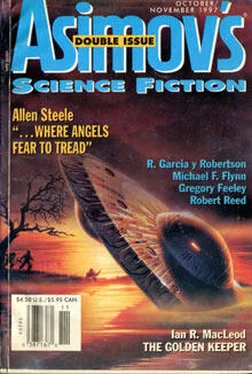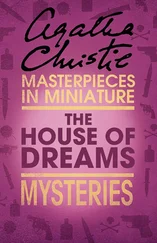House of Dreams
by Michael F. Flynn

Illustration by Janet Aulisio
Sometimes, when the light is right, or the angle, you can see the shades of other worlds. There is a spot off Sandy Hook where graceful ships of unknown design sail past the double-turreted lighthouse. Near Rittenhouse Square in Philadelphia, residents on Waverly Place claim that elegant but oddly dressed men and women sometimes cross the street. In Michigan, motorists passing the Six Mile Road exit in Livonia report fleeting glimpses of a line of dispirited men walking through pouring rain.
It may be some trick of the light, a peculiar form of polarization. Or it may be some sort of quantum resonance between worldlines abutting. Science is helpless to explain these sights; barely acknowledges their existence. It is not even clear if these are glimpses of what was or what will be or what might have been. Perhaps they are only places where the walls between adjacent universes have worn thin, allowing glimpses through the remaining scrim.
Now that’s a cold-blooded way to look at it! What do you know of worldlines abutting or the walls of universes? It’s all just words. It may be the heart that sees these things and not the mind; and what the heart sees is not bound by physics.
Ted moved into Pennyworth House one bright April day with two suitcases, full of dreams. No, the suitcases didn’t contain dreams (though they did hold architects’ renderings and plans) nor did April days (though they are certainly conducive to them). I meant that Ted was full of dreams; or the house was.
The joke about Pennyworth House was that it wasn’t. There had been a time when the block was called “Millionaire’s Row” and Plainfield was the country refuge of the great textile magnates; but those days are long fled. The mills are overseas now, and Plainfield no longer rural. Even a million dollars isn’t what it used to be. But they built solid back then, and age has only seasoned the place. It was that oddly American style we call Puritan-Victorian, extravagant but frowning on excess. Just the sort of house to appeal to the urban homesteader.
Ted laid his suitcases out in the room he and Sharon had chosen as a master bedroom. It was a fine room with a separate sitting area, a dresser and armoire, a four-poster canopy bed that scattered dust when he swatted the draperies. The bed would have to go. It was a bit too old and a bit too used to suit Sharon, though it would do for now while he sorted the furnishings and prepared the house for moving day.
He positioned a family portrait on the dresser facing the bed. That’s Ted in the rear, the one with the goofy, unworldly look. Sharon sits in the foreground, with large, prominent eyes and a crown of golden-brown hair. Her arm wraps around Billy, who tries (and fails) to conceal the six-year-old bored look. How can a boy squirm in a still photo? Yet, each time Ted looked at that picture, that kid was in a different position. If it weren’t for Sharon’s arm holding him, he’d be off the frame entirely.
From the suitcase flap, Ted pulled out pads of colored Post-It notes and the lists that Sharon had given him. There was a lot of old furniture to dispose of before the moving van arrived; and the sooner he got started, the better. Starting in the first floor “parlor,” Ted placed green stickers on the items Sharon had decided to keep, and red on those to be donated to the poor. The lists were systematic, arranged by room; but then, Sharon had a lawyer’s systematic mind. Ted was more the dreamer, the scientist.
The poor apparently had a desperate need for Victorian bric-a-brac. An umbrella stand—just the thing for a needy household! (Don’t laugh. Maybe their roofs leak.) Occasionally, an item puzzled him. A gasogene? A portmanteau? He would need a dictionary to finish this job! Hey, Ted was no mouth-breather! He had his share of degrees. But some things were simply beyond his ken. Chair with anti-macassars… What was an anti-macassar? Were there pro-macassars? Were macassars anything on which one ought even to take a position?
From time to time, Ted was tempted to switch the red and green stickers. Why toss that footstool but keep that monstrosity of a cabinet? But he refrained. Sharon had very firm notions, some internal litmus that separated the fashionably retro from the hopelessly outmoded.
In the basement stairwell, he found a flashlight as long as his forearm hanging in the space between the door and the wall. Ted noticed it because he was searching for the light switch. That was also how he discovered that the electricity hadn’t been turned on yet; so it was just as well the flashlight was hanging where it was. Though it would have been better if it hadn’t been.
It was surprisingly heavy, even for its size, and he nearly dropped it. Judging by the dust and the pattern of little rust spots, he thought the batteries would be long dead; so the glare almost blinded him when he pressed the stud.
People, that was a flashlight! It was the Mother of All Flashlights. Ted spent a long time blinking away the spots. A light that strong should have illuminated the entire basement. A light that strong should have illuminated Union County. Yet, when he aimed it down the stairs, the colors were dim and washed out; and the stairs, walls, support beams, all had a dull sepia tint, like an old photograph.
A hint of movement at the edge of the light caught his eye. He tried to track it, but saw nothing. But just to be on the safe side, he closed the basement door when he left and made a note to call the exterminators as soon as he had phone service. Sharon would have a fit if she knew there were mice in the house.
He was half-finished with the furniture checklist when the windows faded to twilight gray and the outlines of the furnishings took on a more tentative look. He could have tucked it in then and snuggled into the covers on that canopy bed. He could have waited until morning, finished his inventory by daylight, and had electricity by evening. But what kind of story would that be? Instead, he worked by flashlight until darkness fell entire. And because he had carried it with him from the basement stairwell, he used that mother flashlight.
He was upstairs by then, in one of the small rooms in the south wing. He had thought it unfurnished—just a small table that Sharon had drafted into the War on Poverty—but when he followed the sepia light inside, he saw that someone had co-opted the room. There was a low stool, a drafting table, and, near the window where the sunlight would catch it, an easel bearing an unfinished painting. On a small table nearby were brushes, a dried-out palette, and paint tubes, crimped and squeezed.
Hey, what’s going on here? None of that crap was there when the realtor had showed the house! Had someone set up an art studio? In his house? And why? (The view wasn’t much; but there might be some special quality to the sunlight. Artists were a strange breed. Stranger than physicists or lawyers in some ways.) Ted turned his light on the painting.
People, that was one nasty collection of daubs! Call it impressionistic if you want, but only if you want to make a bad impression. Even in the dull sepia light, it was a horrid dark. Swaths of black and Prussian blue and other dismal hues swirled on the canvas, suggesting a mouth open in an endless howl. Lurking in the blackness behind it, emergent shapes. Not shapes you could name, or even want to.
The painting both repelled and intrigued, and Ted reached for it. That was how he discovered it wasn’t there. His hand closed on nothing, and the unexpectedness of it threw him off balance, and he stumbled forward.
Читать дальше












